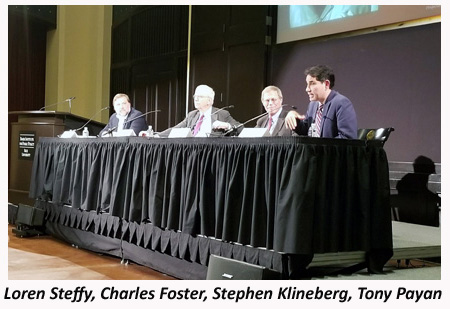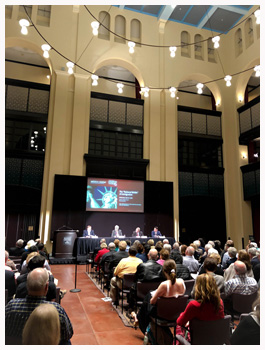The following article was authored by Scott Braddock and originally published on ConstructionCitizen.com.
 In an event that brought tears to the eyes of some in attendance, the filmmakers behind The Rational Middle Immigration Documentary Series unveiled their newest work to Houstonians Wednesday night at Rice University’s Baker Institute for Public Policy. The project is produced with the support of the Center for Houston's Future.
In an event that brought tears to the eyes of some in attendance, the filmmakers behind The Rational Middle Immigration Documentary Series unveiled their newest work to Houstonians Wednesday night at Rice University’s Baker Institute for Public Policy. The project is produced with the support of the Center for Houston's Future.
Pointing to the magnificent setting for the evening’s discussion, CEO of MAREK Construction, Stan Marek, said “Everything you see here, my team of immigrants built.”
“We need these people,” Marek said, noting the nation’s immigration laws have not seen a significant update in decades thanks to gridlock in Washington. “They’ve never had an opportunity for legal status after 1986. It’s broken,” Marek said, adding that he’s excited about promoting a discussion of the issue through new media.
“The first thing we have to do is solve the immigration mess,” Marek said. A broad solution, he said, should begin with granting legal status to undocumented workers who can pass a background check, agree to be part of the E-Verify system, and work for employers who pay and match taxes. “It’s called ID and tax,” Marek said.
“It’s called ID and tax,” Marek said.
Filmmaker Gregory Kallenberg said he was at first hesitant to tackle this issue.
“Hell no,” was his initial response to the idea because it seems both sides are completely intractable. “It’s the third rail,” Kallenberg said. “There’s so much more of ‘anti’ and so little ‘pro.’”
Kallenberg then showed two of the documentary films to the crowd, including the newest one focused on rebuilding Houston after Hurricane Harvey. In that film, Houston Mayor Sylvester Turner said immigrants – both documented and undocumented – are already contributing to the city's vibrant economy, and they should be allowed to thrive.
“Everybody in this city, and I'm saying everybody, not just those with papers, contributes to the economic engine of this city and this region, which impacts the rest of this country,” Turner said. "We don't build walls, we build relationships.”
After the films were shown to the crowd, former Houston Chronicle business columnist Loren Steffy led a panel discussion featuring experts on the issue including Charles Foster, an immigration attorney who served as an adviser to Presidents George W. Bush and Barack Obama. Foster said native-born Americans have had little or no reason to have any understanding of the immigration system. Unlike the health care system or Social Security, American citizens have little reason to ever interact with the immigration system, Foster said.
“Our immigration system is so restrictive,” Foster said. He argued there is a direct correlation between increased border security enforcement and increased illegal immigration. The trip across the border for many immigrants, he said, is now so fraught with danger that many will pay to have their families smuggled into the United States to stay permanently, because they can only afford to make the trip once. That practice, of course, puts them at even greater risk. “There is no line,” said Dr. Stephen Klineberg, professor of sociology at Rice’s Kinder Institute. “The jobs are here waiting for them, needing them, and they can’t get here legally.”
“There is no line,” said Dr. Stephen Klineberg, professor of sociology at Rice’s Kinder Institute. “The jobs are here waiting for them, needing them, and they can’t get here legally.”
Because Houston is the most ethnically diverse metropolitan area in the United States, it is where “the future of America is going to be worked out,” Klineberg said. “Americans have always felt that the last wave of immigration was great and the next wave of immigration is destroying America.”
Tony Payan, a political scientist at the Baker Institute’s Mexico Center, talked about the paradox presented by the fact that the clear majority of Americans want Congress to reform the immigration system, but lawmakers fear their voters will politically punish them for doing so. In Texas, the March primary elections – when the major political parties choose their nominees – are dominated by activists representing the most extreme viewpoints, Payan said. “The game is lost before the game is played,” he said. “By now, it’s too late. What are we going to see in November? A bunch of radicals.”
Payan said the United States will pay a very heavy price if mass deportations of millions of immigrants were to ever happen. It would cause the economy to shrink, “bit by bit.”
Dr. Klineberg, who also conducts polling, said Houstonians agree with this statement more than residents of other major cities: “If you work hard in this city, you will succeed.” Far and away, the group that believes that statement the most strongly is Houston’s Latino immigrants.
Steffy, the panel moderator, told the crowd that if they'd like to see the films screened in their communities, they should reach out to him and to Kallenberg.
You can contact the filmmakers and make a contribution to the effort on their website.

